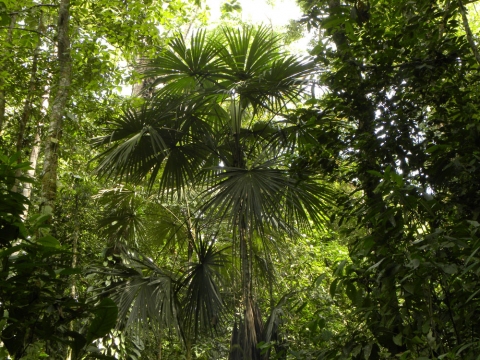Cryosophila guagara
P.H.Allen
Arecaceae
Common Name:
General Information
Cryosophila guagara is a solitary-stemmed, evergreen palm growing 6 - 10 metres tall. The unbranched stem can be 7 - 13cm in diameter; it is covered throughout with root spines; topped by a crown of 18 - 28 fan-shaped leaves[
768- Title
- Field Guide to the Palms of the Americas
- Publication
-
- Author
- Henderson A.; Galeano G.; Bernal R.
- Publisher
- Princeton University Press; Princeton, New Jersey.
- Year
- 1995
- ISBN
- 0-691-08537-4
- Description
- An excellent book, giving basic information on all the 550 species of palms native to the Americas that were known in 1995. Comprehensive information on the plants range and habitat, brief description, some uses and almost 250 photos.
].
The tree is commonly harvested from the wild for its leaves which are used as a source of thatching material. The plant is also harvested for local medicinal use.
Lowland rainforest has greatly declined throughout this plant's range, mainly through conversion to agriculture. The plant is classified as 'Near Threatened' in the IUCN Red List of Threatened Species(2011)[
338- Title
- IUCN Red List of Threatened Species
- Publication
-
- Author
-
- Website
- http://www.iucnredlist.org/
- Publisher
-
- Year
- 0
- ISBN
-
- Description
- A list of plants under threat and facing possible extinction, usually with brief details of the threats and information on habitat.
].
Known Hazards
None known
Botanical References
768- Title
- Field Guide to the Palms of the Americas
- Publication
-
- Author
- Henderson A.; Galeano G.; Bernal R.
- Publisher
- Princeton University Press; Princeton, New Jersey.
- Year
- 1995
- ISBN
- 0-691-08537-4
- Description
- An excellent book, giving basic information on all the 550 species of palms native to the Americas that were known in 1995. Comprehensive information on the plants range and habitat, brief description, some uses and almost 250 photos.
Range
C. America - Panama, Costa Rica.
Habitat
Lowland rain forests at elevations up to 500 metres[
768- Title
- Field Guide to the Palms of the Americas
- Publication
-
- Author
- Henderson A.; Galeano G.; Bernal R.
- Publisher
- Princeton University Press; Princeton, New Jersey.
- Year
- 1995
- ISBN
- 0-691-08537-4
- Description
- An excellent book, giving basic information on all the 550 species of palms native to the Americas that were known in 1995. Comprehensive information on the plants range and habitat, brief description, some uses and almost 250 photos.
].
Properties
| Conservation Status | Near Threatened |
| Medicinal Rating |      |
| Other Uses Rating |      |
| Habit | Evergreen Tree |
| Height | 8.00 m |
| Cultivation Status | Wild |
Cultivation Details
Not known
Edible Uses
None known
Medicinal
The heart of the palm (apical bud) is eaten locally for medicinal purposes[
338- Title
- IUCN Red List of Threatened Species
- Publication
-
- Author
-
- Website
- http://www.iucnredlist.org/
- Publisher
-
- Year
- 0
- ISBN
-
- Description
- A list of plants under threat and facing possible extinction, usually with brief details of the threats and information on habitat.
].
Other Uses
The leaves are used for thatching[
768- Title
- Field Guide to the Palms of the Americas
- Publication
-
- Author
- Henderson A.; Galeano G.; Bernal R.
- Publisher
- Princeton University Press; Princeton, New Jersey.
- Year
- 1995
- ISBN
- 0-691-08537-4
- Description
- An excellent book, giving basic information on all the 550 species of palms native to the Americas that were known in 1995. Comprehensive information on the plants range and habitat, brief description, some uses and almost 250 photos.
].
Propagation
Seed -
If you have any useful information about this plant, please leave a comment. Comments have to be approved before they are shown here.








 Useful Tropical Plants Database 2014 by
Ken Fern,
web interface by
Ajna Fern
with help from
Richard Morris.
Useful Tropical Plants Database 2014 by
Ken Fern,
web interface by
Ajna Fern
with help from
Richard Morris.